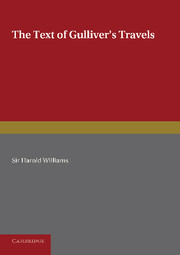I - The Publication of Gulliver's Travels
Published online by Cambridge University Press: 05 June 2016
Summary
It has been said, and, in my opinion, without undue exaggeration, that Swift's writings ‘bristle with editorial difficulties as complex as any in the whole range of English literature’. I may, therefore, be forgiven for occupying myself in these lectures with an author to whom I have devoted many years of study without exhausting, by any means, all that may be said bibliographically and textually about his writings. Within the bounds of bibliography and text I hope to confine myself, so far as I can control any tendency to stray.
Not long after the war of 1914—18, when demobilized, I entered by a chance for which I can call to mind no prompting the shop of J. and J. Leighton, antiquarian booksellers of high standing in their day, though now for many years only a memory of the past. I bought, again for no reason that I can remember, two of the 1726 editions of Gulliver's Travels. I had not then any special interest in Swift; but in life it is only the unexpected that happens. At home I began to turn over the pages of the four volumes I had purchased, and before long it was borne in upon me that here was a bibliographical problem calling for solution. I ransacked the shelves of booksellers. I read their catalogues. Soon more and more editions of Gulliver lined my own shelves. The problem began to clear itself; and I, who had never previously given much of my time to the minutiae of bibliography or textual research, succeeded, I hope, in teaching myself some guiding principles.
In 1926, the bicentenary of the publication of Qulliver's Travels, I brought out an edition following the first text, although I maintained in my introduction that the Dublin version, published by George Faulkner in 1735, represented Swift's last thoughts and was nearer to the original manuscript from which, with excisions and alterations, Benjamin Motte printed the first edition in London. It was not until I was well forward with my work that I came upon Contributions towards a Bibliography of Gulliver's Travels, 1922., by an American scholar, Lucius L. Hubbard. To his work and to correspondence with him I make grateful acknowledgement. We had independently ranged ourselves on the side of Faulkner. This preference has met with general acceptance.
- Type
- Chapter
- Information
- The Text of Gulliver's Travels , pp. 1 - 30Publisher: Cambridge University PressPrint publication year: 2013



